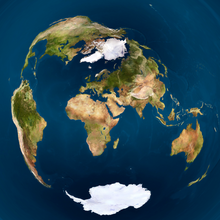#!/usr/bin/env python
import re, math, png
path_in = 'mya/Earthmap1000x500.png'
path_out = 'Valeriepieris_circle_azimuthal_equal_area.png'
colour_circle = [255, 255, 0]
radius_circle = 0.51
thickness_circle = 0.01
lat_centre = 21.7
long_centre = 99.383333
zoom = 0.5
# zoom = 0.33
# out_size = 512
out_size = 2048
out_size_half = out_size * 0.5
class Png:
def __init__(self, path_in):
(self.width, self.height, self.pixels, self.metadata) = png.Reader(path_in).read_flat()
self.planes = self.metadata['planes']
def __str__(self): return str((self.width, self.height, len(self.pixels), self.metadata))
def write(self, path_out):
png.Writer(width=self.width, height=self.height,
bitdepth=self.metadata['bitdepth'], interlace=self.metadata['interlace'],
planes=self.metadata['planes'], greyscale=self.metadata['greyscale'],
alpha=self.metadata['alpha']).write_array(open(path_out, 'wb'), self.pixels)
## Formula from http://mathworld.wolfram.com/AzimuthalEquidistantProjection.html
def azimuthal_equidistant_to_equirectangular(x, y, lat_centre, long_centre):
c = math.hypot(x, y)
if c == 0 or (abs(lat_centre) == 90 and y == 0): return (0, 0)
sin_c = math.sin(c)
cos_c = math.cos(c)
lat_centre_rad = math.radians(lat_centre)
sin_lat_centre = math.sin(lat_centre_rad)
cos_lat_centre = math.cos(lat_centre_rad)
to_asin = cos_c * sin_lat_centre + y * sin_c * cos_lat_centre / c
if abs(to_asin) > 1: return (0, 0)
lat = math.degrees(math.asin(to_asin))
long = (math.degrees(math.atan2(-x, y) if lat_centre == 90 else
math.atan2( x, y) if lat_centre == -90 else
math.atan2(x * sin_c, c * cos_lat_centre * cos_c -
y * sin_lat_centre * sin_c)) +
long_centre + 540) % 360 - 180 ## +540%360-180 to make range [-180,180)
return (lat, long)
## From http://mathworld.wolfram.com/LambertAzimuthalEqual-AreaProjection.html
def azimuthal_equal_area_to_equirectangular(x, y, lat_centre, long_centre):
rho = math.hypot(x, y)
if rho == 0 or (abs(lat_centre) == 90 and y == 0) or abs(rho * 0.5) > 1:
return (None, None)
c = 2 * math.asin(rho * 0.5)
sin_c = math.sin(c)
cos_c = math.cos(c)
lat_centre_rad = math.radians(lat_centre)
sin_lat_centre = math.sin(lat_centre_rad)
cos_lat_centre = math.cos(lat_centre_rad)
to_asin = cos_c * sin_lat_centre + y * sin_c * cos_lat_centre / rho
if abs(to_asin) > 1: return (None, None)
lat = math.degrees(math.asin(to_asin))
long = (math.degrees(math.atan2(x * sin_c, rho * cos_lat_centre * cos_c -
y * sin_lat_centre * sin_c)) +
long_centre + 540) % 360 - 180 ## +540%360-180 to make range [-180,180)
return (lat, long)
png_in = Png(path_in)
print(png_in)
print(png_in.pixels[:20])
png_out = Png(path_in) ## copy most of original's metadata
png_out.width = png_out.height = out_size
png_out.pixels = [0] * (png_out.width * png_out.height)
print(png_out)
for out_y in range(out_size):
for out_x in range(out_size):
x = (out_x / out_size_half - 1) / zoom
y = (out_y / out_size_half - 1) / -zoom
if abs(math.hypot(x,y) - radius_circle) < thickness_circle * zoom:
colour = colour_circle
else:
# (lat, long) = azimuthal_equidistant_to_equirectangular(x, y, lat_centre, long_centre)
(lat, long) = azimuthal_equal_area_to_equirectangular(x, y, lat_centre, long_centre)
if lat is None or long is None:
colour = [0] * png_out.planes
else:
in_y = int(png_in.height * ( 90 - lat ) / 180.0)
in_x = int(png_in.width * (180 + long) / 360.0)
in_offset = (in_y * png_in.width + in_x ) * png_in .planes
colour = png_in.pixels[in_offset :in_offset + png_in.planes]
out_offset = (out_y * out_size + out_x) * png_out.planes
png_out.pixels[out_offset:out_offset + png_out.planes] = colour
png_out.write(path_out)







